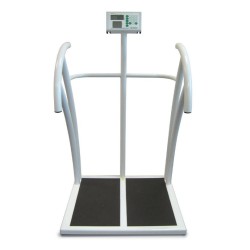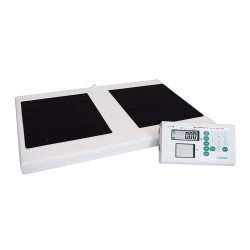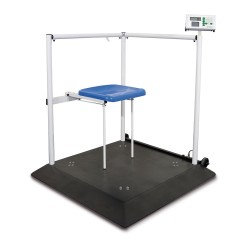Bariatric Medical Scales
There are 3 products.
Active filters
About Bariatric Medical Scales
High-Capacity Weighing Solutions for Bariatric Patient Care
Bariatric medical scales provide essential high-capacity weighing equipment specifically designed for patients with obesity, serving hospitals, bariatric clinics, care facilities, and healthcare services throughout England, Scotland, Wales, and Northern Ireland. These robust weighing devices feature reinforced construction supporting significantly higher weights than standard scales, extra-wide platforms accommodating larger body dimensions safely, enhanced accuracy across extended weight ranges, and appropriate handrails or support features enhancing stability during weighing. Healthcare environments rely on bariatric scales for weighing patients in bariatric surgery programmes requiring precise weight monitoring, managing obesity-related health conditions tracking intervention effectiveness, dosing weight-based medications requiring accurate calculations, monitoring fluid retention in cardiac or renal patients with obesity, and providing routine health surveillance ensuring patients of all sizes receive appropriate care. Modern bariatric scales incorporate features including capacity typically 300-500kg exceeding standard medical scales, ultra-low platforms reducing step-up height, clear displays positioned for easy reading, and stable platforms providing secure patient positioning. The provision of appropriate bariatric scales demonstrates commitment to size-inclusive healthcare, prevents discrimination ensuring all patients can access weight monitoring, and supports evidence-based bariatric care through accurate clinical data across professional healthcare environments.
The implementation of bariatric medical scales directly supports CQC compliance through accessible patient care meeting equality requirements, appropriate clinical monitoring for all patient sizes, and demonstration of dignity in care through suitable equipment provision. Healthcare services lacking appropriate bariatric scales face serious challenges including inability to weigh larger patients compromising clinical care, patient distress from attempting to use inadequate equipment potentially causing injury or dignity violations, and discrimination through provision of services accessible only to smaller patients. Bariatric scales address these challenges by providing safe weighing for patients across the weight spectrum, delivering accurate measurements supporting clinical decisions, maintaining patient dignity through appropriately sized equipment, and enabling routine monitoring supporting obesity management and associated health conditions. Clinical benefits include accurate medication dosing for weight-based treatments, monitoring of weight loss following bariatric surgery or lifestyle interventions, fluid balance assessment in cardiac patients with obesity, and nutritional assessment supporting dietary interventions. Healthcare organisations benefit from appropriate bariatric scale provision through reduced complaints regarding inadequate equipment, improved clinical outcomes through better monitoring data, and enhanced reputation as size-inclusive healthcare providers. Modern bariatric scales incorporate dignity-preserving features including private weighing areas, chairs or rails providing stability support, and considerate designs throughout England, Scotland, Wales, and Northern Ireland.
Selecting and implementing bariatric medical scales requires assessment of patient populations, appropriate capacity specification, and integration with size-inclusive care strategies across healthcare facilities throughout the UK. Organisations should evaluate the proportion of bariatric patients served determining whether dedicated bariatric scales or scales serving dual purposes with sufficient capacity prove more appropriate, assess maximum weights requiring accommodation, and consider whether floor scales, chair scales, or wheelchair scales best meet needs. Equipment selection should prioritise certified medical devices meeting accuracy standards across extended weight ranges, appropriate capacity based on patient assessment typically 400-500kg, platform dimensions accommodating larger body sizes safely, and sturdy handrails or support features where needed. Implementation protocols must encompass staff training on sensitive communication about weighing, proper scale operation including tare functions, and procedures respecting patient dignity including privacy. Quality assurance measures should include regular calibration maintaining accuracy particularly important at higher weights, documented maintenance of structural integrity, and monitoring of patient feedback regarding weighing experiences. Modern bariatric scales incorporate features such as extra-wide displays showing weights clearly, voice output options reducing need to observe displays, and multiple measurement units. Organisations should establish protocols ensuring bariatric scales are available when needed, train all staff on their location and use, and integrate weights into clinical pathways. Clinical teams should practise sensitive communication about weighing, recognise psychological aspects of weight monitoring for patients with obesity, and focus conversations on health rather than appearance. Environmental considerations should include locating bariatric scales in private areas, ensuring sufficient space around equipment, and maintaining equipment appearance. Staff education should address weight bias, emphasising that appropriate equipment provision represents professional responsibility rather than special treatment. By implementing bariatric medical scales and size-inclusive weighing protocols, healthcare organisations throughout England, Scotland, Wales, and Northern Ireland demonstrate their commitment to CQC standards, equality and anti-discrimination in healthcare, patient dignity through appropriate equipment, and comprehensive clinical care supporting all patients regardless of size, enabling evidence-based interventions and routine monitoring across diverse patient populations with sensitivity and professional respect.



